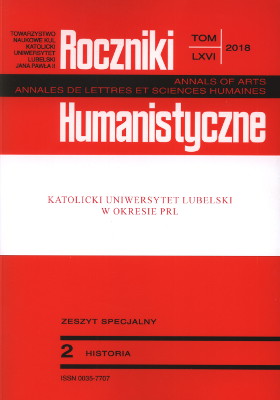Urząd do Spraw Wyznań wobec Katolickiego Uniwersytetu Lubelskiego. Wybrane zagadnienia
Bureau for Religious Affairs and Catholic University of Lublin. Selected Issues
Author(s): Konrad BiałeckiSubject(s): History, Recent History (1900 till today), WW II and following years (1940 - 1949), Post-War period (1950 - 1989)
Published by: Towarzystwo Naukowe KUL & Katolicki Uniwersytet Lubelski Jana Pawła II
Keywords: Catholic University of Lublin; Bureau for Religious Affairs; Polish People’s Republic; communists; Roman Catholic Church
Summary/Abstract: In 1950-1989, the Religious Denominations Bureau was among the most significant tools by means of which the communist authorities administered their religious policy. The role of the Bureau and its branch offices (in Lublin, branch offices of the Religious Denomination Department at the Presidium of the Provincial National Council and since May 1975, at the Province Office) was not limited to collecting data or developing expert reports submitted before the communist party. The Bureau was also in charge of making decisions and dismissing doubts whenever a state authority, be it a ministry or a municipal national council, investigated cases related to religious matters. In such instances, the Religious Denominations Bureau or its branch office expressed opinions, made recommendations, suggested solutions and approved them. It is worth adding that the Bureau’s operations were coordinated with many other state authorities and fully subordinated to the general directives laid down by the Polish United Workers’ Party. All the above mentioned forms of activity were sustained by the Religious Denominations Bureau in relation with the Catholic University of Lublin (KUL).To sum up: a thesis may be put forward that the Religious Denominations Bureau proved a very effective tool employed by the communist governments pursuing specific assumptions of their policy on the University. This policy evolved in the subsequent decades. While in the 1950s and by the mid-1960s efforts were made predominantly to limit the scope of KUL’s operations as much as it was possible, turning it into a small, parochial university without recognised faculty members or secular departments, in the mid-1960s new tactics were adopted. The emphasis was placed on making the faculty members more “loyal” and lessening the political pressure in return. Despite some partial successes, the Religious Denominations Bureau failed to fully control the faculty members or the students as testified in the numerous reports drawn by the officials on the local and central levels in the 1970s and 1980s.
Journal: Roczniki Humanistyczne
- Issue Year: 66/2018
- Issue No: 2S
- Page Range: 9-35
- Page Count: 27
- Language: Polish

